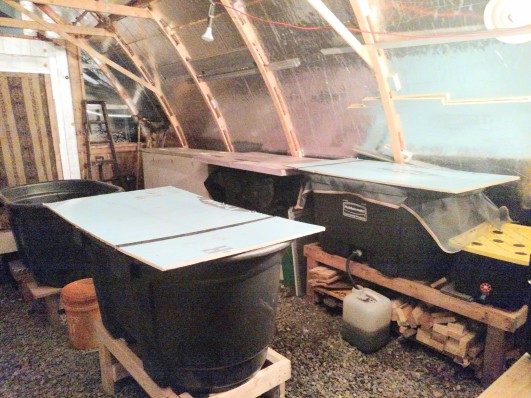 One of the most disturbing social trends (and there are so many) unfolding beneath our feet here in the US is farmers being priced out of land ownership. Since former Secretary of Agriculture Earl Butz infamously demanded, “get big or get out!” millions of small farms foreclosed, went bankrupt, or got pushed out of the business. Agribusiness replaced agriculture: Wendell Berry sounded the alarm of the Unsettling of America. And now it’s getting worse.
One of the most disturbing social trends (and there are so many) unfolding beneath our feet here in the US is farmers being priced out of land ownership. Since former Secretary of Agriculture Earl Butz infamously demanded, “get big or get out!” millions of small farms foreclosed, went bankrupt, or got pushed out of the business. Agribusiness replaced agriculture: Wendell Berry sounded the alarm of the Unsettling of America. And now it’s getting worse.
Many middle-class hippies who went “back to the land” in the sixties and seventies could afford to buy a little farm, but not necessarily to make a living at farming. Today, most US farms lose money. An unbelievable 95%, according to Agricultural Justice Project. Most small farmers are subsidizing the local organic food movement with second or third jobs. Milking the goat or weeding the garden is our third shift. Meanwhile, agriculture brings in almost $60-70 billion a year. What’s wrong with this picture?
Everything. The price of food has almost nothing to do with its value or the cost of growing it–labor, land, inputs, or environmental externalities. Food that kills you is cheaper than food that nourishes. The entire economy is so twisted, that the land we need to grow the food we need to live is valued orders of magnitude higher for building new houses or box stores, even in a state like Rhode Island, where there is enough housing for the people who are here and malls are empty.
But most concerning is the trend toward tenant farming, and even worse, young farmers commuting to their rented farmland. Rhode Island’s young farmers not only can’t afford a down payment on their farm, they can’t even rent a farm with a farmhouse. Besides the unsustainability of the driving, there’s the psychological disconnect from the rhythms of the land they steward, and the disincentive to take care of the soil for the long term.
Soil is the–shall we say–bedrock of organic farming. Healthy soil feeds healthy plants that can resist insects, disease, drought–all kinds of trouble. But building healthy farm soil is a multiyear project, and if a farmer doesn’t have land tenure–know they can stay on their land as long as they like–there’s always the threat that their investment in soil could be taken away from them when comes time to renew a lease.
When we were looking for the land that became Listening Tree, aware of these issues, we consulted with Equity Trust, the Cooperative Development Institute, and other food movement groups to develop our structure as a limited-equity cooperative, with 10 share holders, each able to negotiate an agreement with the group regarding stewarding a part of the land for their own farm or other land-based business. Those agreements will ensure land tenure, after a trial period of one growing season, while both farmer and household can ensure they are ready to commit to stewarding this beautiful land.
The co-op owner-members use a kind of consensus process to ensure decision making is collaborative and fair. Together, we’ll adopt agreements with interested members for “farm shares”–ownership shares that include living here plus a commitment to use and take care of specific fields of the farmland. Farmer owner members will be responsible to the community, but will be able to run their own business without fear of losing their land.




 The last of our open-house potlucks for 2019 is Oct. 5, 4-8 pm. Please come if you are interested in living and/or farming here, or just to connect, stay in touch, enjoy the farms and home, and hear more about what we are doing.
The last of our open-house potlucks for 2019 is Oct. 5, 4-8 pm. Please come if you are interested in living and/or farming here, or just to connect, stay in touch, enjoy the farms and home, and hear more about what we are doing.
 One of the most disturbing social trends (and there are so many) unfolding beneath our feet here in the US is farmers being priced out of land ownership. Since former Secretary of Agriculture Earl Butz infamously demanded, “get big or get out!” millions of small farms foreclosed, went bankrupt, or got pushed out of the business. Agribusiness replaced agriculture: Wendell Berry sounded the alarm of the Unsettling of America. And now it’s getting worse.
One of the most disturbing social trends (and there are so many) unfolding beneath our feet here in the US is farmers being priced out of land ownership. Since former Secretary of Agriculture Earl Butz infamously demanded, “get big or get out!” millions of small farms foreclosed, went bankrupt, or got pushed out of the business. Agribusiness replaced agriculture: Wendell Berry sounded the alarm of the Unsettling of America. And now it’s getting worse.